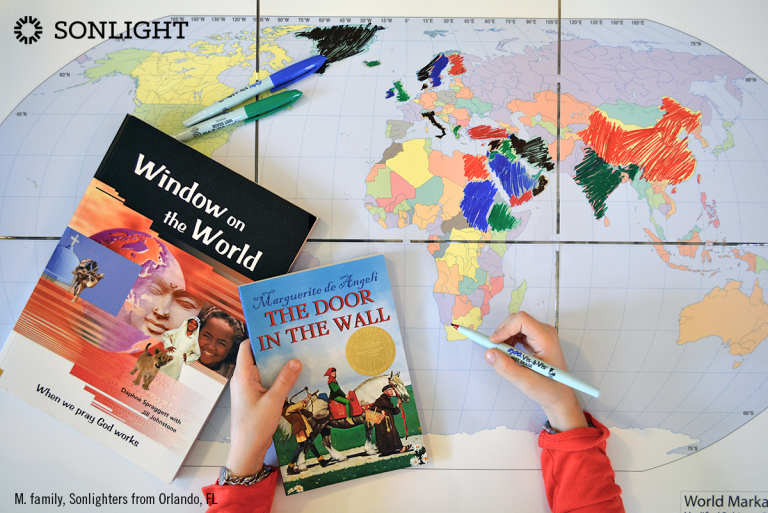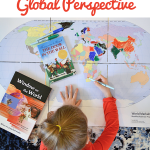
I was a missionary kid who lived in three countries on two continents by the time I was eight years old, so I’m probably biased when it comes to the idea of homeschooling from a global perspective. The way I was raised gave me such a heart for this whole beautiful kaleidoscope of a world in all its wonderfully diverse corners. So a global perspective is really important to me, obviously, but I also think nurturing a global perspective in our children is really important as well—and an endeavor well worth our time.
1. God Created the Whole World
This may sound trite, but it’s true. The Psalmist marveled, “The earth is the Lord's, and everything in it, the world, and all who live in it.” (Psalm 24:1, NIV). The whole earth—from one sea to the next, from the vast steppes of Asia to the petite little islands dotting the emerald waters—the whole, big, beautiful earth is our Lord’s. And this verse isn’t just talking about geography, although we can stand in awe of his creation in that realm as well. But the Psalmist adds, “...and all who live in it.” All! Every single last person, from every culture, in every far-flung nation, everywhere.
2. Expanding our Worldview Tempers Arrogance
The more we learn about other cultures, the more our eyes are opened to the fact that our Americanized Western way, while more familiar to us, is not the only way. We needn’t fear that expanding our global worldview will cause us to promote moral relativism—a shift in absolute values of right and wrong. If we nurture a global perspective in light of the gospel, we can see many cultural differences for just what they are—cultural differences—and we can appreciate the diversity throughout our Father’s world.
3. A Global View Enriches our Lives
Certain things are just plain beautiful, wouldn’t you agree? God’s painted it across the skies, throughout the mountain canyons, down in the ocean depths, and He’s even sprinkled beauty across the darkest corners of outer space. The first book of Genesis tells us God, the creator of beauty, fashioned men and women in His own likeness. Look out at the incredibly varied palette He used to sculpt the sea of faces spread across this great globe. What a breathtaking reflection of the image of God!
We tend to underestimate both His love for beauty and His love for diversity. He created us as makers, too, with a hunger and thirst for this same beauty. I see His hands in the beauty of the world:
- vibrantly-woven threads of Hmong embroidery
- the folk-art florals of Scandinavia
- the painted pottery of Oaxaca
- the undulating clay rooftops stretched out across Ljubljana
When we homeschool from a global perspective, we can make it a priority to savor God's beauty and love of diversity.

4. We Do Not Know What Our Children's Futures Hold
As parents, we must be sensitive to the ways in which the Holy Spirit leads our children individually. When our children express a softness to a particular culture, or ask to study a certain language we find obscure, we must be careful not to dismiss these wishes too hastily in the name of impracticality. God is bigger than our man-made obstacles of impracticality, and we must be particularly cautious as parents not to get in the way of God’s leading. We can have no way of knowing, now, if God will call them to a lifetime of service right here in their hometown or if He’s leading them halfway around the globe. But God knows!
5. A Global Worldview Makes Us More Compassionate
When we homeschool from a global perspective, our lives intertwine more and more with people from around the globe and our own cities, we often find that places and people groups are catching our ear on the news in ways they never did before. We begin to become more aware of news, and with it, our awareness of suffering, war, loss, hunger, and pain grows as well. Our hearts are softened, and our own trials dim in comparison. A global worldview loosens our grip on our own complaints and softens our hearts to the hardships of others.
6. Jesus Has a Global Perspective
As Christians, should we not be among the most internationally-minded? Our Saviour is a middle-Eastern man who urged us to “Go into the world. Go everywhere and announce the Message of God’s good news to one and all.” (March 16:15, The Message). Jesus welcomed all—those with sworn allegiance to Rome, the men pouring over the Torah, outcast women and Samaritans—everyone.
Paul echoes this later, when he tells the Galatians, “ In Christ’s family there can be no division into Jew and non-Jew, slave and free, male and female. Among us you are all equal. That is, we are all in a common relationship with Jesus Christ.” (Galatians 3: 28, The Message)
7. Heaven has a Global Population
God valued diversity enough that he carried it over into the heavenly realm, a place where so much is vastly unrecognizable from our life on earth. He could have easily redesigned life in heaven it all so we all blended together—but He didn’t. John tells us, in Revelation 7:9,, “After this I looked, and there before me was a great multitude that no one could count, from every nation, tribe, people and language standing before the throne and before the Lamb.”
Isn’t that beautiful sight more than enough to convince us to keep our eyes internationally-minded here on earth as we homeschool from a global perspective?
Choose a homeschool curriculum with a Christ-centered, global perspective integrated into its very fabric. Go to SmoothCourse and get started with Sonlight today.








